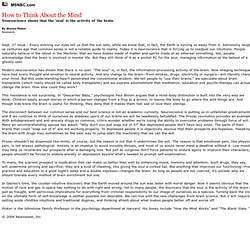

VS Ramachandran: The neurons that shaped civilization. MSNBC - How to Think About the Mind - StumbleUpon. How to Think About the MindNeuroscience shows that the 'soul' is the activity of the brain Sept. 27 issue - Every evening our eyes tell us that the sun sets, while we know that, in fact, the Earth is turning us away from it.

Astronomy taught us centuries ago that common sense is not a reliable guide to reality. Today it is neuroscience that is forcing us to readjust our intuitions. People naturally believe in the Ghost in the Machine: that we have bodies made of matter and spirits made of an ethereal something. Yes, people acknowledge that the brain is involved in mental life. Modern neuroscience has shown that there is no user. This resistance is not surprising. The disconnect between our common sense and our best science is not an academic curiosity. Prozac shouldn't be dispensed like mints, of course, but the reason is not that it undermines the will. To many, the scariest prospect is medication that can make us better than well by enhancing mood, memory and attention. Piano stairs - TheFunTheory.com - Rolighetsteorin.se - StumbleUpon.
Personal and Historical Perspectives of Hans Bethe - StumbleUpon. Nobel winner ties mental illness to immune defect. A Nobel Prize-winning University of Utah geneticist discovered that bone marrow transplants cure mutant mice who pull out their hair compulsively. The study provides the first cause-and-effect link between immune system cells and mental illness, and points toward eventual new psychiatric treatments. "We're showing there is a direct relationship between a psychiatric disorder and the immune system, specifically cells named microglia that are derived from bone marrow" and are found in the brain, says Mario Capecchi, a distinguished professor of human genetics at the University of Utah School of Medicine. "There's been an inference.
But nobody has previously made a direct connection between the two. " The findings - published in the Friday, May 28 issue of the journal Cell - should inspire researchers "to think about potential new immune-based therapies for psychiatric disorders," says Capecchi, a 2007 Nobel laureate in physiology or medicine. Hox genes orchestrate embryo development.
Two new scientific studies reveal hallucinogens are good for your mental health - StumbleUpon. A molecular link between the active component of m... [Mol Pharm. 2006... Penn_study_shows_why_sleep_is_needed_to_form_memories from sciencecodex.com. PHILADELPHIA – If you ever argued with your mother when she told you to get some sleep after studying for an exam instead of pulling an all-nighter, you owe her an apology, because it turns out she's right. And now, scientists are beginning to understand why. In research published this week in Neuron, Marcos Frank, PhD, Assistant Professor of Neuroscience, at the University of Pennsylvania School of Medicine, postdoctoral researcher Sara Aton, PhD, and colleagues describe for the first time how cellular changes in the sleeping brain promote the formation of memories.
"This is the first real direct insight into how the brain, on a cellular level, changes the strength of its connections during sleep," Frank says. The findings, says Frank, reveal that the brain during sleep is fundamentally different from the brain during wakefulness. "We find that the biochemical changes are simply not happening in the neurons of animals that are awake," Frank says. A molecular explanation is emerging.